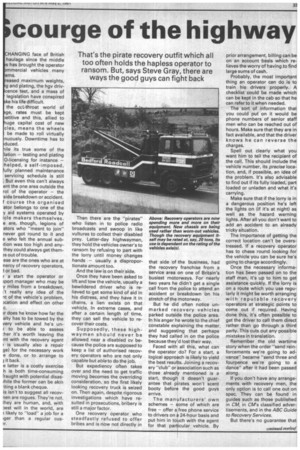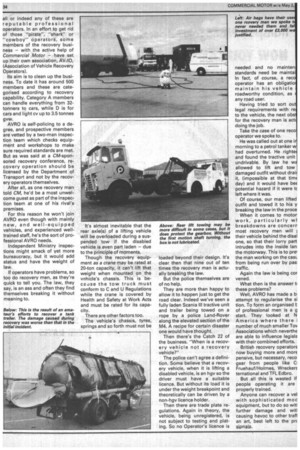courge of the highway
Page 43

Page 44

If you've noticed an error in this article please click here to report it so we can fix it.
That's the pirate recovery outfit which all too often holds the hapless operator to ransom. But, says Steve Gray, there are ways the good guys can fight back
CHANGING face of British haulage since the middle s has brought the operator mmercial vehicles many ems.
reased maximum weights, g and plating, the hgv drivcence test, and a mass of legislation have conspired ke his life difficult.
the c&..throat world of ge, rates must be kept etitive and this, allied to uge capital cost of new cles, means the wheels be made to roll virtually nuously. Downtime has to duced.
lie its true some of the lation — testing and plating 0-licensing for instance — helped, a self-imposed, ully planned maintenance servicing schedule is still But even this can't always ent the one area outside the rol of the operator — the side breakdown or accident. f course the organised .ator belongs to one of the y aid systems operated by icle makers themselves.
e are, though, legions of • ators who "meant to join" never got round to it and
e who felt the annual subAion was too high and anythey could always get them3s out of trouble.
ese are the ones who are at nercy of recovery operators, or bad.
r a start the operator or ;port manager who may be y miles from a breakdown, really any idea of the nt of the vehicle's problem, )cation and effect on other C.
edoes he know how far the alty has to be towed by the very vehicle and he's un
to be able to assess ther it's worth leaving the tnt with the recovery agent is usually also a repair ge) for the necessary work e done, or to arrange to 3 it back.
e latter is a costly exercise
h is both time-consuming fraught with potential disas/hile the former can be akin -iting a blank cheque.
is isn't to suggest all recovnen are rogues. They're not. they are human, and, with best will in the world, are 3 likely to "load" a job for a 'ger than a regular cuse-.
Then there are the "pirates" who listen in to police radio broadcasts and swoop in like vultures to collect their disabled prey. Latter-day highwaymen, they hold the vehicles owner's to ransom by refusing to part with the lorry until money changes hands — usually a disproportionate amount too.
And the law is on their side.
Once they have been asked to lift and tow the vehicle, usually a bewildered driver who is relieved to get some kind of aid in his distress, and they have it in chains, a lien exists on that vehicle. In extreme cases, and after a certain length of time, they can sell the vehicle to recover their costs.
Supposedly, these highwaymen should never be allowed near a disabled cv because the police are supposed to keep a list of authorised recovery operators who are not only capable but ableto do the job.
But expediency often takes over and the need to get traffic moving becomes the overriding consideration, so the first likely looking recovery truck is seized on. Then again, despite rigorous investigations which have resulted in prosecutions, bribery is still a major factor.
One recovery operator who steadfastly refused to offer bribes and is now not directly in that side of the business, had the recovery franchise from a service area on one of Britain's busiest motorways. For nearly two years he didn't get a single call from the police to attend an accident or breakdown On his stretch of the motorway.
But he did often notice unmarked recovery vehicles parked outside the police area. In his anger he wrote to the chief constable explaining the matter. and suggesting that perhaps they had called in on the police because they'd lost their way.
Faced with all this, what can the operator do? For a start, a logical approach is likely to yield the best resulits. Joining a recovery "club" or association such as those alreadY mentioned is a start, though it doesn't guarantee that pirates won't scent booty before the good guys arrive.
The manufacturers' own schemes — some of which are free — offer a free phone service to drivers on a 24-hour basis and put him in touch with the agent for that particular vehicle. By
prior arrangement, billing can be on an account basis which relieves the worry of having to find large sums of cash.
Probably, the most important thing an operator can do is to train his drivers properly. A checklist could be made which can be kept in the cab so that he can refer to it when needed.
The sort of information that you could put on it would be phone numbers of senior staff men who can be reached out of hours. Make sure that they are in fact available, and that the driver knows he can reverse the charges.
Spell out clearly what you want him to tell the recipient of the call. This should include the
vehicle number, its precise location, and, if possible, an idea of
the problem. It's al's° advisable to find out if its fully loaded, part loaded or unladen and what it's carrying.
Make sure that if the lorry is in a dangerous position he's left the lights on (if it's at night) as well as the hazard warning lights. After all you don't want to add an accident to an already tricky situation.
The importance of getting the correct location -can't be overs tressed. If a recovery operator has to chase round looking for the vehicle you can be sure he's going to charge accordingly.
Once the necessary information has been passed on to the staff man, it's up to him to get assistance quickly. If the lorry is on a route which you use regu larly it might be worth arranging with reputable recovery operators at strategic points to come out if required. Having done this, it's often possible to get the driver to call them direct rather than go through a third party. This cuts out any possible mistakes in translation.
Remember the old wartime story when the order "send rein forcements we're going to advance" became "send three and fourpence we're going to a dance" after it had been passed along.
If you don't have any arrangements with recovery men, the only option is to call one out on spec. They can be found in guides such as those published in CM, in CM's classified advertisements, and in the ABC Guide to Recovery Services.
But there's no guarantee that all or indeed any of these are reputable professional operators. In an effort to get rid of those "pirate", "shark" or "cowboy" operators, some members of the recovery business — with the active help of Commercial Motor — have set up their own association, AVAO, (Association of Vehicle Recovery Operators).
Its aim is to clean up the business. To date it has around 500 members and these are categorised according to recovery capability. Category A members can handle everything from 32tonners to cars, while D is for cars and light cv up to 3.5 tonnes gvw.
AVRO is self-policing to a degree, and prospective members are vetted by a two-man inspection team which checks equipment and workshops to make sure required standards are met. But as was said at a CM-sponsored recovery conference, recovery operation should be licensed by the Department of Transport and not by the recovery operators themselves.
After all, as one recovery man told CM, he'd be a most unwelcome guest as part of the inspection team at one of his rival's premises.
For this reason he won't join AVRO even though with mainly new, and well-equipped vehicles, and experienced welltrained staff, he's the sort of professional AVRO needs.
Independent Ministry inspections might smack of yet more bureaucracy, but it would add status and have the weight of law.
If operators have problems, so too do recovery men, as they're quick to tell you. The law, they say, is an ass and often they find themselves breaking it without meaning to. It's almost inevitable that the rear axle(s) of a lifting vehicle will be overloaded during a suspended tow if the disabled vehicle is even part laden — due to the principle of moments.
Though the recovery equipment as a crane may be rated at 20-ton capacity, it can't lift that weight when mounted on the vahicle's chassis. This is beca u se the tow truck must conform to C and U Regulations while the crane is covered by Health and Safety at Work Acts and must be rated for its capacity.
There are other factors too. The vehicle's chassis, tyres, springs and so forth must not be loaded beyond their design. It's clear then that nine out of ten times the recovery man is actually breaking the law.
But the police themselves are of no help.
They are more than happy to allow it to happen just to get the road clear. Indeed we've seen a fully laden Scania III tractive unit and trailer being towed on a rope by a police Land-Rover along the elevated section of the M4. A recipe for certain disaster one would have thought.
Then there's the Catch 22 of the business. "When is a recovery vehicle not a recovery vehicle?"
The police can't agree a definition. Some believe that a recovery vehicle, when it is lifting a disabled vehicle, is an hgv so the driver must have a suitable licence. But without its load it is under the weight breakpoint and theoretically can be driven by a non-hgv licence holder.
Then there are trade plate regulations. Again in theory, the vehicle, being unregistered, is not subject to testing and plating. So no Operator's licence is needed and no mainten standards need be mainta In fact, of course, a reco operator has an obligatio maintain his vehicle roadworthy condition, as any road user.
Having tried to sort ou legal requirements with re to the vehicle, the next obs for the recovery man is act doing the job.
Take the case of one reco operator we spoke to.
He was called out at one i morning to a petrol tanker w had overturned. He righte and found the tractive unit undrivable. By law he w allowed to lift and tow damaged outfit without drai it, (impossible at that time day) and it would have beE potential hazard if it were tc left where it was.
Of course, our man lifted outfit and towed it to his y breaking the law in the proce
When it comes to motor work, particularly wt breakdowns are concerr most recovery men will their vehicle behind the disal one, so that their lorry part intrudes into the inside Ian the motorway. This is to pre, the man working on the case from being run over by pas: traffic.
Again the law is being cor vened.
What then is the answer ti these problems?
Well, AVRO has made a attempt to regularise the si tion. To form an organised of professional men is a g start. They looked at N America where there i number of much smaller Toy Associations which neverthE are able to influence legisla with their combined efforts.
British recovery operators now buying more and morE pensive, but necessary, reco gear from people like CI Fruehauf/Holmes, Wreckers ternational and TFL Edbro.
But all this is wasted if people operating it are properly trained.
Anyone can recover a vet with sophisticated mod equipment, but to do so witl further damage and witl causing havoc to other trafi an art, best left to the prc sionaLs.
















































































































